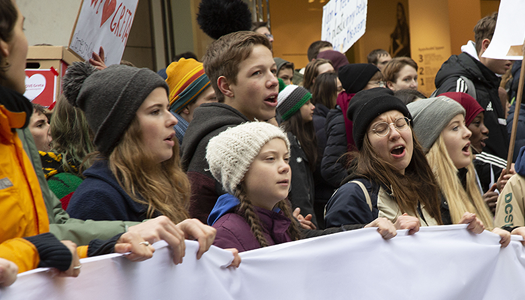Framing "Climate Crisis"

Image credit: Klimastreik_19-03-01_0177, Hamburg, 1 March 2019, © campact 2019, Creative Commons Licence (CC BY-NC 2.0)
Some years ago, in a class on organizational communication, I learned something that has always stayed with me: that communication is the organization.
Notions of buildings, policy manuals, history and other corporate paraphernalia can overwhelm the simple but profound insight that organizations are nothing more nor less than the networks among those populating them. This extends nicely to how we function as a society. Communication is how we make sense of the world and share that, be it in our thoughts, or with a partner, a small group, a class, an organization, or an imponderable vast throng through the miracle of Boolean ether.
This has important implications for what knowledge keepers, scientists and a battery of other reliable sources tell us is an ecological emergency threatening the Earth in epic proportions. An oft-cited place to start is the United Nations’ Intergovernmental Panel on Climate Change. Here at RRU, we can look to our president’s recent op-ed, campus conversation and support for the student-led, international strike for action on climate change, culminating today.
In the field of environmental communication, we learn that communication serves both to explain our surroundings and our relationship to them, and to invite responses to that. How we communicate about our environment deeply influences not only what we think about it, but also, ultimately, what we do about it. And critically, as the climate activist, Greta Thunberg, is the latest to remind us, what we don’t do about it.
In my classes, we explore framing, the practice of positioning messages in ways that draw on people’s mental models to favour specific perspectives. A recent example from popular media stems from The Guardian’s decision to use ‘climate crisis’ and other terms that “more accurately describe” the state of the planet’s health. This triggered discussions in newsrooms in Canada and the US. For example, the CBC noted that although reporters are free to use whatever terms they like, the “whiff of advocacy” engendered by the term ‘crisis’ requires caution by a public broadcaster tasked to maintain neutrality.
Some might counter that the unprecedented ecological and existential threat posed by climate change and other environmental concerns such as marine pollution and the extinction of species warrant more than passive, ‘neutral’ reporting to inform people about these issues.
Critical scholars add that so-called ‘neutrality’ actually favours business as usual, which, when it comes to practices like extracting fossil fuels, has been proven to be unsustainable not only environmentally but also for the social and economic injustices that it causes. Here they allude to a dominant political and economic ethic, neoliberalism, which privileges the market (and those who control and profit from it) as the prime driver of societal decision-making.
Fans of communication and cultural studies raise the question of whether we can ever really be neutral in our messaging. As the eminent scholar, John Durham Peters (a visiting lecturer at RRU in 2018), suggests, we are hardwired by our own experience to be subjective. Even what we communicate about involves a choice to foreground some issues over others (agenda setting).
This can involve a fine balance. In a striking example from political communication, one fine Monday last June, the House of Commons of Canada passed a resolution declaring a climate emergency, following like declarations now made by 1,039 jurisdictions in 19 countries and deploying what we can call a frame of environmental protection. That Tuesday, the federal Liberal government reapproved the controversial proposed expansion of the Trans Mountain Pipeline (which it had purchased), prioritizing its purported economic benefits through a frame of economic growth—a move that critics claim jeopardizes Canada’s commitments under the Paris Agreement on limiting greenhouse gases, along with its treaty obligations to Indigenous Peoples under both Canada’s Constitution and the UN Declaration on the Rights of Indigenous Peoples. Meanwhile, other critics assail the feds’ position on the pipeline as a bad business decision and also damaging to Canada’s international reputation for the foregoing reasons or as creating uncertainty for financial investors.
This typifies the arch-polarization that can accompany public dialogue on climate change and other pressing and substantial environmental issues. Yet as the atmospheric scientist, Katharine Hayhoe, observes, “A thermometer is not ‘liberal’ nor ‘conservative’.” Climate concerns all life (and non-life) on Earth.
We got a startling reminder of this in a quiz at the last campus conversation, with this quote: “If we've learned any lessons during the past few decades, perhaps the most important is that preservation of our environment is not a partisan challenge; it’s common sense.” The quote was sourced to US president Ronald Reagan, hailing from the Republican Party and considered an iconic founder of neoliberal practice. Here climate change is framed as universal and uniting, rather than divisive and driven by ‘special interests’, as some pols would have us believe.
At the end of the day, whether we communicate at all, what we communicate about, what we communicate and how we communicate it can, and do, all make a profound difference. And climate change, whether framed as a crisis and/or otherwise, presents practitioners and scholars of communication with what seems to be our most vital and daunting challenge yet.
Geo Takach PhD is an associate professor in the School of Communication and Culture (SCC) who develops and teaches undergraduate and graduate courses in environmental communication for SCC and for the School of Environment and Sustainability, respectively. His more recent books are Tar Wars (University of Alberta Press, 2017) and Scripting the Environment (Palgrave Macmillan, 2016).